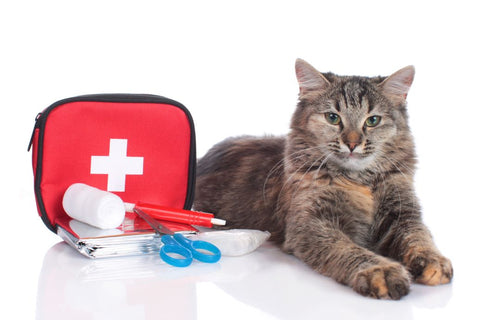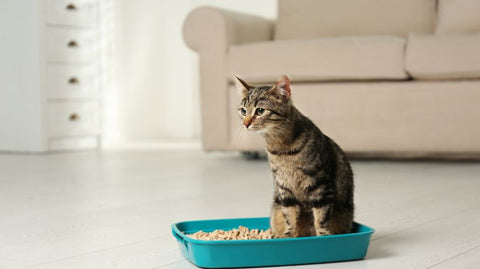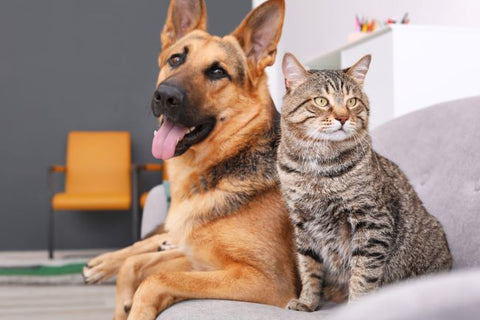

Common Cat Illnesses: What Every Cat Parent Should Know
Cats might have nine lives, but they are not unbeatable! Just like us, our pet kitties can get sick. If you are a caring cat owner, knowing the most common cat diseases can help you spot problems early. This way, you can get treatment and keep your feline friend happy. Here is a useful guide about nine common health issues that could affect your cat and tips to help them stay healthy.
What are the symptoms of common cat illnesses that pet owners should look out for?
Common cat illnesses can show symptoms such as changes in appetite, losing weight, feeling tired, vomiting, diarrhea, coughing, sneezing, and trouble breathing. Keep an eye on any changes in their behavior. If you see anything unusual, talk to a vet. Early detection is important for getting proper treatment. This can help improve your four-legged companion's quality of life and overall well-being.
They can get colds too! URIs happen because of viruses or bacteria. They are especially common in kittens or homes with many cats.
What are some common cat illnesses that pet owners should be aware of?
Common cat illnesses that pet owners should be aware of include urinary tract infections, feline leukemia, diabetes, upper respiratory infections, and kidney disease. Regular vet check-ups, a balanced diet, and a clean environment can help prevent these illnesses.
Let's dig a little deeper, now.
1. Upper Respiratory Infections (URIs)
Symptoms:
-
Sneezing
-
Runny nose (nasal discharge)
-
Eye problems
-
Fever
-
Loss of appetite
-
Trouble breathing
Prevention Tips:
-
Make sure your cat's vaccines are current.
-
Keep the space tidy, especially if you have several cats.
-
Supplement with Respiratory Support for Cats daily or as needed for respiratory distress flare ups.
2. Feline Lower Urinary Tract Disease (FLUTD)
FLUTD is a combination of several issues that impact a cat's bladder and urethra. Factors like stress, being overweight, or not drinking enough water can make this painful condition worse.
Symptoms:
-
Difficulty urinating
-
Going to the litter box a lot but not getting much out
-
Blood in urine
-
Excessively licking the genital area
What You Can Do:
-
Give your kitty a lot of fresh water.
-
Feed your furry friend a balanced diet to keep a healthy weight.
-
Think about using supplements such as Urinary Tract Support to help with urinary health.
3. Feline Immunodeficiency Virus (FIV)
Feline Immunodeficiency Virus (FIV) is a serious illness that affects a cat's immune system, making them more susceptible to other infections and diseases.
Symptoms:
-
Long-lasting skin, eye, or urinary tract infections
-
Swollen gums or problems with teeth
-
Losing weight
-
Having a fever
-
Enlarged lymph nodes
How To Help:
-
Make a calm place for your feline friend.
-
Take them to the vet regularly to control signs of illness.
-
Help their immune systems with good food and supplements.
articlebanners1
4. Hairballs
Hairballs are not just unpleasant; they can also cause blockages in the stomach and intestines. Breeds that have long fur are more likely to have this problem.
Signs of Trouble:
-
Vomiting or gagging that keeps happening
-
A loss of appetite
-
Feeling very tired or lazy, lethargy
Prevention:
-
Groom your pet regularly to help with shedding.
-
Use digestive health supplements, such as our Cat Probiotic Powder, to manage hairballs.
5. Obesity
A little extra weight might look cute, but being overweight can cause diabetes, joint problems, and other health issues, even in healthy cats.
Signs Your Cat May Be Overweight:
-
Trouble grooming
-
Low energy
-
Noticeable fat spots
How to Help Them Slim Down:
-
Measure their meals.
-
Select diets that are high in protein and quality.
-
Include playtime each day for exercise.
6. Dental Disease
Dental problems are a big health issue for felines that often get ignored. When plaque and tartar build up, it can cause gum disease, pain, and even lead to losing teeth.
Symptoms:
-
Bad breath
-
Difficulty eating
-
Red or swollen gums
Prevention:
-
Clean your cat’s teeth often (if they allow you to!).
-
Give dental treats or toys.
7. External & Intestinal Parasites
Parasites like fleas, ticks, and worms often bother cats. They can also cause more serious health problems.
Symptoms of Parasite Infestation:
-
Itching and scratching
-
Hair loss
-
You can see fleas or flea dirt
-
Vomiting or diarrhea (possibly from worms)
Prevention:
-
Use vet recommended parasite prevention for cats.
-
Keep your kitty's area clean.
8. Chronic Kidney Disease (CKD)
CKD is a common problem in older cats. This is a long-lasting condition that impacts how well the kidneys work. It needs regular care and management.
Symptoms:
-
Thirsty and needing to urinate often
-
Losing weight
-
Bad coat condition or losing hair
Management Tips:
-
Provide a diet that is good for kidney health.
-
Offer supplements such as Kidney Health Support for natural help.
9. Feline Leukemia Virus (FeLV)
Feline Leukemia Virus (FeLV) is an important issue to be aware of, especially for cat owners. It is a viral infection that can lead to various health complications and even life-threatening conditions in cats of all ages.
Symptoms:
-
Weight loss
-
Fever
-
Pale gums
Management Tips:
-
Keep your cat inside to avoid contact with other sick cats.
-
Regular vet visits and shots are important to prevent FeLV.
articlebanners2
Home Remedies and Care for Common Cat Illnesses
When you need to take care of common cat illnesses like obesity, dental disease, parasites, and chronic kidney disease, there are several easy steps you can follow at home. These treatment options can help your cat feel better and stay healthy.
-
Obesity: Keep an eye on your cat's food. Make sure they have enough playtime to exercise. You might want to use interactive toys or puzzles to keep them moving.
-
Dental Disease: Regularly brush your cat's teeth with a toothbrush and toothpaste made for pets.
-
Parasites: Follow a regular plan to prevent parasites, as suggested by your vet. Make sure your cat's living area is clean and free of parasites.
-
Chronic Kidney Disease: Listen to your vet about the best diet and supplements for kidney health. Keep a close watch on your cat's water intake and overall health.
By noticing symptoms early, taking steps to prevent issues, and giving proper care, you can be a great pet parent.
Breed-Specific Illnesses and Prevention
Different cat breeds can be more prone to certain sicknesses and health issues, just like people. Knowing these risks for each breed can help you take steps to keep your feline friend healthy and happy.
For instance, Persian cats often have breathing problems because of their flat faces. In contrast, Siamese cats might face more dental issues. Some other breed-specific cat illnesses are:
-
Himalayan cats: can be prone to polycystic kidney disease
-
Maine Coons: may have a higher risk of heart disease.
-
Scottish Folds: might suffer from joint issues due to their unique ear structure.
Understanding breed-specific illnesses can help you work closely with your vet to develop a preventive care plan tailored to your cat's specific needs. Regular check-ups, vaccinations, and a healthy lifestyle can go a long way in ensuring your feline companion leads a happy and healthy life.
Keeping Your Cat Healthy
Being active in caring for your cat’s health can help a lot. Here are some simple tips:
-
Set up regular checkups with the vet.
-
Make sure vaccinations and parasite prevention are updated.
-
Give a healthy diet and promote daily exercise.
-
Pay attention to any changes in behavior, appetite, or litter box habits.
Emergency Situations and First Aid
Taking care of our cats’ health and happiness is important. Being ready for an emergency is just as necessary. If your cat gets very sick or hurt, you need to know what to do. When an emergency happens, try to stay calm and act fast. After you help your cat feel better, call your veterinarian or the nearest emergency animal hospital for advice. While you wait, you can do some basic first aid. For example, you can put pressure on scratches or deep bite wounds to stop bleeding. Keeping your cat warm can also help them feel stable until help gets there. Refer to our quick guide to Cat First Aid here.
Being watchful about your cat's health is very important. Know the risks that come with your cat's breed. You should also take steps like getting blood tests from time to time. This helps keep your cat happy and healthy. Regular check-ups, preventive care, and acting quickly in emergencies are essential for your cat's well-being.
Impact of Lifestyle on Cat Health
Your lifestyle and your cat's lifestyle can affect both of your health. If your cat stays mostly lazy, their health can decline, just like ours. A lack of exercise and not eating a healthy diet can cause many health problems for both cats and people. This includes issues with blood sugar levels, which may show an inadequate response to changes in diet.
It's very important to help your young kittens have a long and healthy life from the beginning. While you consider ways to improve your own lifestyle, like taking more walks or eating better, remember to do the same for your cat! This way, they will be happier, healthier, and live longer.
Final Thoughts
Cats are known for being independent, but they need us to stay healthy. By learning about common cat illnesses and ways to prevent or manage them, you help your feline friend live a long and happy life. Do you have questions about your cat’s health? Prana Pets is here to offer natural supplements that fit your pet’s needs.
Check out all our health-boosting products for cats here.
articlebanners3




